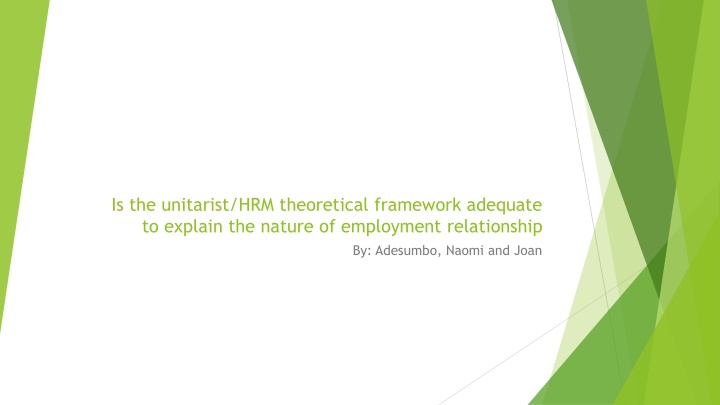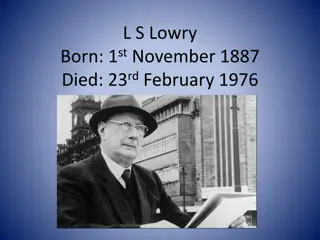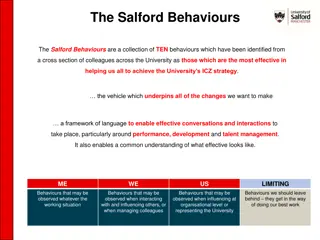
Unitarist HRM Theoretical Framework: An Analysis of Employment Relationships
Explore the adequacy of the unitarist/HRM theoretical framework in explaining employment relationships, highlighting its managerial orientation, limitations in addressing power differentials, and the need for worker representation in today's work environment.
Download Presentation

Please find below an Image/Link to download the presentation.
The content on the website is provided AS IS for your information and personal use only. It may not be sold, licensed, or shared on other websites without obtaining consent from the author. If you encounter any issues during the download, it is possible that the publisher has removed the file from their server.
You are allowed to download the files provided on this website for personal or commercial use, subject to the condition that they are used lawfully. All files are the property of their respective owners.
The content on the website is provided AS IS for your information and personal use only. It may not be sold, licensed, or shared on other websites without obtaining consent from the author.
E N D
Presentation Transcript
Is the unitarist/HRM theoretical framework adequate to explain the nature of employment relationship By: Adesumbo, Naomi and Joan
Unitarist Perspective Every work organisation is an integrated and harmonious whole, with manager and workers having common basic values, interest and objectives Single legitimate sources of authority and leadership for a united team- management s right to manage Conflict is irrational Trade unions should be denied a presence within the organisation Perspective of HRM practitioners and non-union employers
1 It is distinctly managerial in orientation- reinforcing managerial values and norms in the work situation, and justifying their dominant authority position
2 Ignores the gross inequality of power and control which exists within organisations
3 Fails to recognise the existence of different interest between workers and management which are genuine and justifiable.
4 Does not take into account the real needs of employees for genuine say in how work is originated and run
5 It makes assumption that managers decisions are rational and contain within them the interest of all employees, when in fact concerned for themselves.
6 The assumption of consensus and harmony in the workplace does not accord with the reality of conflict - sometimes expressed in strikes which are legitimate.
7 Falsely reassures management that the blame for conflict can be placed with employees rather managers
CONCLUSION In todays world of precarious work arrangements - such as zero hours contracts, low wages, job insecurity, lack of benefits and pension cuts - workers need an independent voice to represent their interests This makes trade unionism more relevant in today s work environment than ever before.
Hence, the pluralist theoretical framework would be a much more useful analytical framework from which to understand the employment relationship, The unitarist perspective is completely flawed and should be thrown into the bin ..!!









